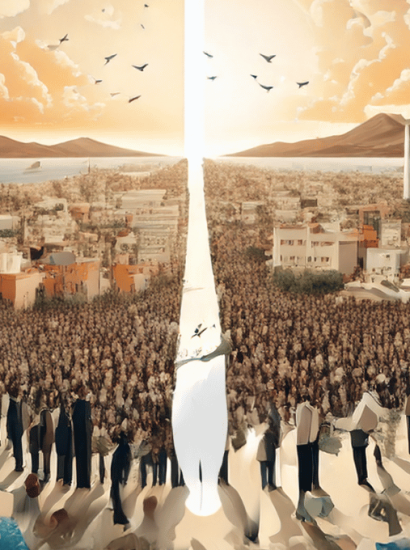This post is also available in: ΕΛΛΗΝΙΚΑ (GREEK) TÜRKÇE (TURKISH)
The first time I saw her was in January 1996. She had been brought from Karpasia specifically to receive an award. “Greek woman of the Year”! She was holding, I remember, a few Daffodils in her hand and while talking her eyes watered and her voice trembled with sobs. Back then she was a “female icon”. A “modern heroine”. In schools, children wrote essays about her struggle. Governments showcased her and used her in their election promises. Associations and private individuals honoured her. To her, however, the awards caused only sadness. “…Because we are expecting from you, while you… Because we stayed there so you could make the claim, while you… Because we held on so you could assert our rights, while you…”
Her speech was a slap in the face. A slap in the face to those of us who got comfortable, who made the struggle a profession and built careers, political or otherwise, on the backs of living and dead martyrs… And as she addressed us, saying: “What do you have as a person there? What about your family? Your loved ones? Your home? Your property? What about your dignity? Our every moment is a wound…”, we pretended to be touched, to understand and empathise.
In 1997, a year after being awarded, she fell ill. Clerides brought her to the free areas and promised her that he would personally see to it that she returned to her home. He and Denktaş had made a deal, he told her. She remembers the date as if it were today. May 26, 1997. The next day an official visited her in hospital. “By September, when you’ll be back,” he told her. She understood. “Eleni, you’re screwed.”
Staying away from her village and her school was tantamount to death for her. She tried to return. Many times. But in vain. They asked her to issue an identity card of the pseudo-state. She was expelled from the checkpoint by force. She was attacked, suffered minor injuries. In the ‘free areas’, she was slowly marginalised, those in power kept their distance and then forgot about her. Her voice became a nuisance to them. In schools, children gradually stopped writing essays about her struggle.
The bon vivants stopped giving her awards. And they shamelessly joked about a few hairs above her lips, her… “moustache!” A woman who lived under occupation for an entirety of 23 years. Who was on medication, cortisone… Yes, we wanted her with halawa [hair removal].
From time to time she was used by various people in the “the areas controlled by the Republic“. They used her and exploited her. Some did not hesitate, for their own benefit, to parade her as an exhibit at events. To drag her to the checkpoints, to put her up as a banner at “protest events“. Until her paint washed off. She was no longer of any use to them either.
I saw her again years later, in 2006. Eight thirty at night. She spoke with modesty as always. Her speech, almost beseeching. She neither accused nor denounced anyone. She was asking the state to grant her – “if it is able” – a better house. The one she lived in could only fit a bed, including the kitchen. It took them a year and a half. After a lot of struggle, to raise “awareness”. The new one, also a one-bedroom. But the minister was… generous. He lifted the burden of the… urban planning derogation, and they built her – “in garage-style” they told her – an extra room. That’s why the door is so big, it looks like a garage, in order to… deceive. Who? And why?
In 2018, I saw her name in the newspapers. “Eleni Foka defeated Turkey”, they wrote. She sought justice in 1995, alleging a slew of violations involving her mistreatment and the theft of her personal belongings when she tried to go to her village. The ECtHR only dealt with Article 10 concerning the right to freedom of expression and awarded compensation of… 300 euros (!) for the stolen objects. I spontaneously called her on the phone. Her voice still carried (or evoked) the same emotion. Her speech, deeply sorrowful. Yet, when I visited her one morning, even though she had told me her grievances, she did not want them written down. Οnly write the good things, she told me. “I felt loved by the people, but the state made me feel like an interloper. Let bygones be bygones, though. I want you to write only the good things.”
*On the occasion of the presentation of the fictional biography by Evridiki Pericleous-Papadopoulou “And many were her sorrows – Eleni of Karpasia”, Nefeli Publishing, on Wednesday, October 9, at 7pm at the Presidential Palace. More on page 7.
Source: “AND MANY WERE HER SORROWS…”






